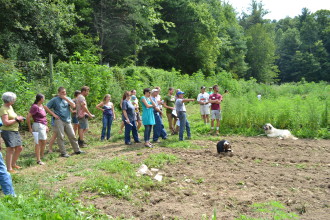When Tom and Karen Elmore were starting their 10-acre Leicester farm, now called Thatchmore, in 1987, their neighbors thought the new operation was a little odd.
“There were a lot of conventional farmers around, and a lot of our neighbors were doing farming part time, but there weren’t many people doing it in the style we intended to do,” Tom says.
The Elmores were interested in labor-intensive, small-scale farming with less focus on mechanical labor and more emphasis on organic growing — even going so far as to pursue their organic certification the first year they were in production. But all that came with a steep learning curve, Tom says.
“We really had to hunt to find a support network,” he explains. “Slowly over time we developed the experience and expertise to grow our crops, but it was a kind of a struggle.”
Today, Tom serves on the board of Organic Growers School, an organization that is part of a new initiative to make sure the next generation of farmers in Western North Carolina have better access to farmer-to-farmer education and support.

A new program from OGS, WNC FarmLink and Southern Appalachian Highlands Conservancy called Farm Pathways will combine peer support and land access with a structured curriculum centered on farm production and business. The program is now in the development stages thanks to a grant from the U.S. Department of Agriculture’s Farmer Rancher Development Program.
“This grant is allowing us the luxury to really dig in and create a farmer training program that is inclusive of farmer needs and looks at the challenges farmers in WNC are facing,” says Cameron Farlow, farmer programs coordinator with OGS. “It will allow us to create connections to other allies and communities that are already doing really good work, learn from national programs and glean the best of all those tools.”
Farlow says Farm Pathways is designed to attract and support new and beginning farmers — a growing urgency as the average age of farmers in both WNC and the country is climbing, with many farmers ready to retire. So far, younger generations have been hesitant to take over family farms or enter into agriculture-based businesses.
Part of this, according to Chris Link, Farm and Food program manager with SAHC, is that a lot of younger people only conceive of conventional, large-scale farming, which isn’t an accurate reflection of the agriculture that happens in WNC. “A lot of young folks have this view of farming as laborious work with low pay, and just really unrewarding,” Link says. “A lot of potential younger farmers haven’t seen the models that are popping up now that are smaller-scale methods, and they don’t realize that you can make a pretty decent living on small acreage, depending on your markets and your efficiency.”
The curriculum that SAHC, FarmLink and OGS are working to create would combine classroom learning with visits to established farms, where students can see the theories they’re studying put in action. The program would be informed by existing programs, including SAHC’s Farm Incubator program and OGS’s WNC Craft program. The idea, Farlow says, is to duplicate a traditional apprenticeship system.
“To be a farmer, some people can do it just by jumping right in, but it’s a much harder battle to do it that way,” she says. “Traditionally, farm kids were raised up on the farm and learned things their whole life, and eventually the land and the business were passed over to them. But now we’re seeing a lot new farmers coming in without that type of background.”
Link adds that the peer support network, which will partner Farm Pathways students with seasoned growers like the Elmores, can be critical in the early years of a farm business. “There’s all these little things that can be pretty overwhelming,” he says. “But when you can call someone, have them come out to your farm, look at what is happening and say, ‘I know what to do,’ it just greatly lowers that anxiety.”
Another huge barrier for young farmers is finding land to farm, Farlow adds, especially as historic farmland in WNC is dwindling due to development or reaching a price point that makes it inaccessible for most people. With only 2 percent of the land in WNC considered prime for agriculture, disappearing farmland has been a concern of all three of Farm Pathways’ parent organizations for years.

In fact, Link says SAHC saw the need to connect land conservation with agriculture education, local economy and local food production a long time ago. The nonprofit has already been working with farmland owners to place their properties into conservation easements that would still allow for sustainable cultivation. Through Farm Pathways, beginning farmers would lease those lands for their agriculture businesses under restrictions and environmental protections set up by SAHC.
“There are people in the community, land owners and otherwise, who are interested in food security and keeping land undeveloped,” Link says. “So part of what we will be doing is developing relationships and finding people who own land and want to protect it, while also supporting the local food system.”
Though affiliated with OGS, Farm Pathways will not be exclusively focused on organic farming, and participants will learn organic and sustainable practices along with conventional methods, Farlow says. The program will not be free, and though the tuition has not yet been established, Farlow notes that OGS intends to set up financial aid and possibly offer a sliding scale for admission. The program is anticipated to take in around 20 people in each year-long session for the first couple of years, though she says she believes it could grow to as many as 40 later on.
Best of all, Link adds, the program would be centered in Asheville, though some regional elements will possibly be added later. “Asheville is such a local-foods town, and there’s such an awareness of the importance of that here,” he says. “It’s the perfect place for these three organizations to come together and create that intersection of local food, local economy and land conservation.”
Farm Pathways is anticipated to roll out in 2016. The program will be applying for a three-year grant in that year to maintain continued financial support. For more information, visit organicgrowersschool.org.



Before you comment
The comments section is here to provide a platform for civil dialogue on the issues we face together as a local community. Xpress is committed to offering this platform for all voices, but when the tone of the discussion gets nasty or strays off topic, we believe many people choose not to participate. Xpress editors are determined to moderate comments to ensure a constructive interchange is maintained. All comments judged not to be in keeping with the spirit of civil discourse will be removed and repeat violators will be banned. See here for our terms of service. Thank you for being part of this effort to promote respectful discussion.